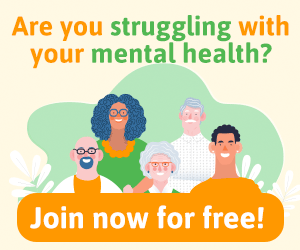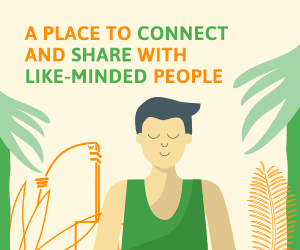Finding it difficult to seek happiness from anything you do? Sonia Vadlamani explores the reasons why a loss of pleasure and motivation could signify an underlying mental health concern. Plus, she suggests seven ways to start rebuilding your happiness.
Several of us find ourselves feeling down at some point in our lives, which could translate to feeling unmotivated, sad, stuck in life or at work, or just bored.
However, if you keep thinking 'nothing makes me happy anymore' or 'what’s the point of life', as well as being unable to take delight in anything in your life, it could be that you are actually in a state of deep depression (perhaps without even realizing it).
Anhedonia, or the inability to derive joy or happiness from anything around us, is a common indication of an underlying mental health issue such as depression, post traumatic stress disorder, or anxiety. While this feeling mimics boredom, it is also coupled with lack of motivation on one’s behalf to try anything, as nothing seems to matter to anymore, and there is no reward or pleasure to be derived from the action.
In fact, it’s estimated that for those living with anhedonia, the regions in the brain that are usually associated with reward anticipation or interest are inflamed. This inflammation causes a dopamine imbalance in the brain, which makes one indifferent to the outcome of any event or situation.
Why nothing makes you happy anymore
It’s important to know that anhedonia – or the distinct sensation that nothing makes you happy – could also be a symptom of a situational depressive episode and need not be characterized as clinical depression. “It's something a lot of people experience, at least at one point in their lives,” states Dr Miranda Nadeau, a licensed psychologist based in Austin, Texas.
Anhedonia can be defeated with consistent effort, but first you may need to pinpoint the underlying causes, so that they can be remedied. There are several plausible reasons why you may not find anything interesting or enjoyable anymore:
Feeling burned out and exhausted
Feeling easily irritable, being sleep-deprived for a long duration and constant lethargy are some of the symptoms associated with burnout. The most usual form of this healthcare issue is seen in the form of workplace burnout, wherein people work through prolonged hours under immense stress, or carry out a wide range of responsibilities without sufficient breaks or rest.

Loneliness and isolation can put us in a depressive state
Loneliness
While loneliness usually occurs in people who live alone or are isolated from others for extended period, a person can feel lonely even when they’re in a crowd. Loneliness as an emotional state takes root when we’re unable to form true connections with others around us. A constant sense of nothing making you happy within can signal loneliness, and the tendency to shut ourselves to the outside world might spiral us deeper into a depressive state, thus making it a vicious cycle.
Boredom
We often feel bored and uninspired because we’re wired to adapt to our circumstances – positive or negative – and after we get used to something, we tend to become indifferent to it and fail to derive any further 'happiness boost' from it. While this hedonic treadmill is a common phenomenon for most of us, sometimes this prolonged apathy or boredom towards life events can spiral towards substance abuse, addiction to unhelpful routines, self-harming behavior and even depression.
• JOIN US! Sign-up to happiness.com and connect with our caring community •
Depression
If you’re feeling blue often and each new day begins with a sense of apprehension, or if activities that used to spark joy fail to evoke any emotion in you, this could indicate the start of a depressive episode. Depression is a complex condition, with both mental and physical symptoms. However, the good news is that once diagnosed, depression can be treated, making it possible for one to eventually lead a happy, fulfilling life.
How to rebuild happiness: 7 steps
While the inability to derive joy from anything is a reason for concern and should be addressed, it’s important to realize that others have been in the same shoes before you and have found their way to happiness once again. So, if you constantly think to yourself 'nothing makes me happy anymore', here are some ideas to help you gradually change this state of mind and feel happier.
1. Get sufficient rest
Research reveals a strong link between troubled sleeping and depression, with sleeping disorders present in nearly 75 per cent of adults diagnosed with depression. Sleep disturbances can raise stress levels and anxiety, impacting one’s overall quality of life.
“If you keep thinking to yourself 'nothing makes me happy anymore' or 'what’s the point of life', it could be that you are actually in a deep depression.”
Indeed, following good sleep hygiene is essential for ensuring good overall health. Some effective sleep hacks include limiting your overall screen-time and consciously shutting all screens at least an hour before bed. Getting good-quality sleep on a regular basis is one of the surest ways to feel better again, according to research.
2. Consult a physician
A persistent feeling that nothing makes you happy could also arise from an underlying medical condition or a sudden shift in your usual lifestyle. For example, those who spend more time indoors are likely to be deficient in vitamin D, which is associated with poor mood, depression and other mental disorders.
Eating disorders and health conditions like hypoactive thyroid or iron deficiency can result in depressive symptoms and heightened anxiety as well. Talking to your doctor and getting the bloodwork and appropriate tests done can help eliminate these potential underlying conditions that could cause unhappiness.
3. Take care of your body
Our food choices affect our mood and health, as revealed from the discovery of the gut-brain axis. Include lots of good mood foods like green vegetables, seeds and nuts, lean meats and prebiotics to improve your mental health and boost your happiness levels. Dehydration is also responsible for blocking the production of serotonin, potentially impairing our ability to think clearly and make us feel tired all the time, and hence it’s important to stay hydrated through the day.
Furthermore, engaging in physical activity will also help combat that 'nothing makes me happy' feeling by releasing endorphins, a type of 'happiness hormone' which can boost our stress management abilities.

Exercise releases happiness-boosting endorphins shutterstock/Rido
In fact, regular exercise can change our brain, in addition to improving heart health and preventing diseases like diabetes. If you can’t access the gym, try mindful running or restorative yoga to introduce the element of mindfulness and relaxation to your daily exercise routine. Starting slow, setting small and realistic goals and being consistent can create noticeable improvements in the way you feel.
4. Re-configure what happiness means to you
At this point, you may be ready to take a deeper glance into what elicits happiness for you and adding activities which may uplift your mood. When I find myself feeling unhappy with my life, I look around for clues as to what makes me happy in the first place, and whether I’ve been doing enough lately to achieve or reinstate that feeling.
If there are obstacles that prevent you from picking up activities you once used to enjoy, try inculcating new activities that may interest you and help you feel less bored with life. While traveling to explore various cuisines and fitness pursuits are activities that generally keep me upbeat, I found it was connecting with nature in the form of gardening – even in a limited apartment space – that helped keep my spirits up through the stress and anguish I experienced around the COVID-19 pandemic.
MORE LIKE THIS:
- What is Soul Loss and Retrieval? Healing Through a Shamanic Lens
- When Life Gives You Lemons, Try Lemonading!
- Feeling Blue or Clinically Depressed? The 4 Things You Should Look Out For
Look for ways to incorporate awe in your life. Including 'expressive therapy', or creative expression in the form of making art, music, dance, writing or creative dialog can improve our ability to cope with emotional issues, while helping us form meaningful relationships with others with similar interests.
5. Meditate regularly
A daily meditation routine and focusing on your breathwork can help to boost happiness levels, albeit over time and with steady practice. There are several types of meditation you could choose from, depending on the skills you wish to learn from meditation and convenience.
“Research suggests that forming meaningful social connections can help you find your way back to happiness.”
For example, gratitude meditation could help you bring attention to the good things in your life, enabling you to release negativity. Deep sleep meditation can improve your sleep quality and help you feel well-rested, rejuvenated, and ready to brave the next day with improved energy levels.
6. Reach out and connect
“Oftentimes people experience anhedonia and other symptoms of depression when they feel their social connections are weak,” states Dr Nadeau. Research suggests that forming meaningful social connections can help you find your way back to happiness. Utilizing the power of friendships and positive communication is important for our overall life-satisfaction and well-being.
RELATED: National Hug Day: 7 Reasons to Embrace More
While intimate connections and close ties are important, even weak ties can impact us positively by providing stimulation and a fresh perspective, as researcher Karen Fingerman points out. Connecting with random strangers during the pandemic can help you and others feel less lonely and isolated, making the world around feel like a better place.
7. Talk to a mental health professional
If none of these ideas are making you feel better and happier, it’s okay to seek professional help when you’re feeling defeated by life. Reaching out and talking to a specialist can help you take stock of your situation and pinpoint the inherent concerns that require addressing or cognitive reframing. Be it dealing with rejection or hurt, working on self-acceptance, or the need to devise work life balance, a therapist can help you process and resolve the underlying issues when you’ve had that 'nothing makes me happy' feeling for a prolonged period.
Takeaway: nothing makes me happy
Most of us tend to lose interest in things we used to enjoy at some point in our lives. However, anhedonia takes this inability to enjoy to its furthest limits, wherein one can’t seem to take delight in anything that once used to spark joy within them, such as food, conversations, music, travel, etc.
If you find that nothing make you happy anymore, start by identifying and addressing the plausible underlying causes. Focus on getting your physical and mental health back on track and indulging in activities that you previously enjoyed or rejuvenate you now.
Try to incorporate one or more happy habits into your routine to gradually combat your 'nothing makes me happy anymore' feeling. However, seeking professional help is essential if you’re struggling to reconnect with happiness on your own. •
Main image: shutterstock/fizkes
If you're experiencing any of the signs of depression make sure to reach out to your local mental health services. In the US, you can also contact the National Suicide Prevention Hotline for free and confidential support. Use Lifeline Chat or call 1-800-273-TALK (8255). In the UK, call 116 123 to talk to Samaritans, or email: [email protected] for a reply within 24 hours. You can also text “SHOUT” to 85258 to contact the Shout Crisis Text Line, or text “YM” if you are under 19.
happiness.com | The fine art of being: learn, practise, share
Are you a happiness.com member? Join free now and:
■ enjoy our happiness magazine
■ share and support in our happiness forum
Written by Sonia Vadlamani
 Fitness and healthy food blogger, food photographer and stylist, travel-addict and future self journaler. Sonia loves to write and has resolved to dedicate her life to revealing how easy and important it is to be happier, stronger and fitter each day. Follow her daily pursuits at FitFoodieDiary or on Instagram.
Fitness and healthy food blogger, food photographer and stylist, travel-addict and future self journaler. Sonia loves to write and has resolved to dedicate her life to revealing how easy and important it is to be happier, stronger and fitter each day. Follow her daily pursuits at FitFoodieDiary or on Instagram.






Join the conversation
You are posting as a guest. If you have an account, sign in now to post with your account.